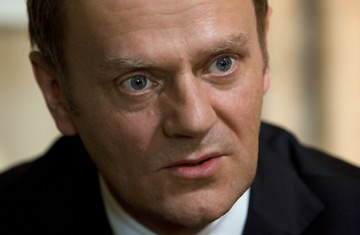
Poland's Prime Minister Donald Tusk
(2 of 2)
Tusk has never been out for the quick fix. Raised in Gdansk as a member of the tiny Kashubian ethnic minority, he joined the anticommunist Solidarity movement in the 1970s while studying history at university. He was later forced by the authorities to work as a house-painter because of his dissident activities. Tusk shared with Lech Walesa and other Solidarity leaders an antipathy to the government that he says was self-evident: "Communism was something so hideous that you had to be an exceptional conformist or a fool not to see the evil around you."
In the mid '80s, Tusk and a group of other Solidarity intellectuals began publishing an underground monthly pamphlet featuring the writings of the liberal economist Friedrich Hayek and essays on private property. Their heroes were Ronald Reagan and Margaret Thatcher. "We had to wait many, many years for our way of thinking to be accepted in Poland," Tusk says. "But now it has been. And we are ready."
Not all Poles share his enthusiasm. Pollsters say that the October election marked the sharpest divide yet between Poland's rural and urban electorate. While the Civic Platform drew most of its support from what pollsters now refer to as Poland A — urban, educated, younger voters — the rural, older, more devout voters who make up Poland B favored Jaroslaw Kaczynski's Law and Justice Party (PIS) and other parties. In crude terms, the first group includes the winners of Poland's economic transition; the second group, the losers.
No place better exemplifies Poland A — Tusk's Poland — than the western university town of Wroclaw, which voted overwhelmingly for him. Poland's fourth largest city, situated on the Oder River close to the German border, was neglected under communism, its Gothic architecture blackened by coal dust and its shop shelves bare. Nowadays, the elegant old market square in the city center, once the site of a few scruffy museums, is lined with designer shops, sushi bars and restaurants. Companies from LG Philips (LCD screens) to Google (service support) have poured $5 billion into the local economy in the past five years, creating 200,000 jobs in a city of just 650,000. The mayor's office reviewed 560 investment projects last year alone. Since 2002, unemployment dropped from 14% to under 5%. Mayor Rafal Dutkiewicz credits low production costs, a good location near the autobahns to Western Europe and a deep pool of educated young workers: local universities graduate 24,000 students each year. To achieve similar results elsewhere, he says, Poland needs better infrastructure and less regulation. "Anything entrepreneurial is still looked upon with suspicion," says Dutkiewicz. "It's crazy! Let people make money."
But Wroclaw is only one version of Poland. Many of the 40% of Poles who still live in smaller towns take a different view. In the village of Radecznica, nestled in rolling hills near the Ukrainian border, some 45% of the 6,500 inhabitants voted for the PIS in the last election; Tusk's party got only 10%. The region is poor: Radecznica's sole employer is a state mental institution. The town lacks paved roads and even a sewage system. Mayor Gabryel Gabka, 58, has applied for European Union money to build one. "But even if we get it, there may not be the people here to do the job," he says. As for Tusk's "liberal" agenda, says Lucjan Bednarz, a local PIS activist: "Only youngsters who are not yet able to have a stable opinion and who are influenced by certain TV programs adopt the kind of rootless, temporary opinions which are favorable to the Civic Platform." As for Tusk himself, says Bednarz, "So far, he hasn't shown anything." PIS supporters, by contrast, he says, "are devout. They go to church and they value patriotism. PIS gives them these values without promising a pie in the sky."
For Poland to flourish in the company of European nations, it has to help places like Radecznica. Tusk acknowledges as much. His party doesn't promote the liberal label and has tried to show a social conscience. During the past election, for example, unsanctioned text messages urged young voters to "hide your grandma's ID" (so that she couldn't vote PIS). The Civic Platform countered with a message that voters should bring Grandma along to the voting booth and explain to her that her future, too, depends on growth.
Tusk needs the cooperation of the opposition — and of Poland B — to push through the legislative changes he believes Poland needs. The opposition, both on the left and the populist right, is not disposed to tolerance. A failure to deliver on promises, PIS leader Jaroslaw Kaczynski warned recently, could produce "serious social conflict" and "social depression." Certainly Poland has had more than its share of both those ills. "I spent an important part of my life participating in conflicts," says Tusk. "But for me conflict was not the main principle." His central task is to heal the ideological divisions of the past and get Poland moving forward together as one.
